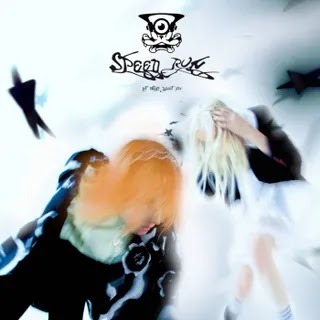Two albums—one a collection of luminous ambient textures and club grooves, the other an eclectic set of experiments from over 20 years ago—illustrate Kieran Hebden’s range and creative development.
For the past few years, if you wanted to discuss one of the most mysterious projects in electronic music, your best bet was to copy/paste. Beginning in 2017, someone started uploading music under the alias ⣎⡇ꉺლ༽இ•̛)ྀ◞ ༎ຶ ༽ৣৢ؞ৢ؞ؖ ꉺლ—a bewildering string of glyphs that, as far as anyone can tell, appears to be gibberish. Between 2017 and 2020, six digital releases appeared, all featuring titles rendered in dingbats type that sometimes spilled down the page like rogue MySpace code, running roughshod over the digital hedgerows of Spotify’s walled garden. The alias was widely understood to be an alter ego of Four Tet’s Kieran Hebden. He had first alerted listeners to the project by adding one of its songs to his ever-growing Spotify playlist; the music sounded like him, too, with bell-tone shrapnel and digitally frayed harp scattered over punchy breakbeats and downy beds of ambient tone. Some listeners discovered early on that a few of these cryptic tracks were in fact deep cuts from Four Tet’s catalog; then, last May, the project’s sixth release contained songs that Hebden had included in a now-deleted SoundCloud dump the month before. With Parallel, one of a pair of new albums that Hebden surprise-released on December 24 and 25, he officially brings some of that mystery material back into the Four Tet fold.
Five of Parallel’s untitled tracks previously turned up on various ⣎⡇ꉺლ༽இ•̛)ྀ◞ ༎ຶ ༽ৣৢ؞ৢ؞ؖ ꉺლ releases, and in some ways the surprise ends there. As was the case with last year’s Sixteen Oceans, most of these tracks represent Hebden’s mastery of the Four Tet sound more than they do an attempt to break out of his wheelhouse. That’s no knock against them: “Parallel 2,” from 2018’s / ̡ ҉ ҉.·๑ඕั ҉ ̸ ̡ ҉ ҉.·๑ඕั ҉ ̸ ̡ ҉ ҉.·๑ඕั ҉ ̸ ̡ ҉ ҉.·๑ඕั ҉ ̸ ̡ ҉ ҉.·๑ඕั ҉ ̸ ̡ ҉ ҉.·๑, is as potent a distillation of Hebden’s unique style as you could ask for. Though the elements are familiar—plucked strings, handcrafted breakbeats, sunset radiance—the results are unusually effortless, with a gliding feel evocative of the ambient techno of the 1990s. “Parallel 4,” from 2019’s ʅ͡͡͡͡͡͡͡͡͡͡͡(ƟӨ)ʃ͡͡͡͡͡͡͡͡͡͡ ꐑ(ཀ ඊູ ఠీੂ೧ູ࿃ूੂ✧ළඕั࿃ूੂ࿃ूੂੂ࿃ूੂළඕั✧ı̴̴̡ ̡̡͡|̲̲̲͡ ̲̲̲͡͡π̲̲͡͡ ɵੂ≢࿃ूੂ೧ູఠీੂ ඊູཀ ꐑ(ʅ͡͡͡͡͡͡͡͡͡͡͡(ƟӨ)ʃ͡͡͡͡͡͡͡͡͡͡, reflects Hebden’s longstanding fascination with the syncopated rhythms of UK garage; arraying ribbon-like vocal cut-ups and chiming synths over a booming, crackling groove, it’s at once wistful and ecstatic, expressing emotions that aren’t easily defined or contained. And “Parallel 8,” which turned up in last April’s SoundCloud dump as “128 Oceans” and then reappeared a month later on ooo ̟̞̝̜̙̘̗̖҉̵̴̨̧̢̡̼̻̺̹̳̲̱̰̯̮̭̬̫̪̩̦̥̤̣̠҈͈͇͉͍͎͓͔͕͖͙͚͜͢͢͢͢͢͢͢͢͢͢͢͢͢͢ͅ oʅ͡͡͡͡͡͡͡͡͡͡͡( ؞ৢ؞ؙؖ⁽⁾˜ัิีึื์๎้็๋๊⦁0 ̟̞̝̜̙̘̗̖҉̵̴̨̧̢̡̼̻̺̹̳̲̱̰̯̮̭̬̫̪̩̦̥̤̣̠҈͈͇͉͍͎͓͔͕͖͙͚͜͢͢͢͢͢͢͢͢͢͢͢͢͢͢ͅ ఠీੂ೧ູ࿃ूੂ, is a stunning hybrid of dub techno and deep house, as polished a club track as Hebden has ever made. Sixteen Oceans’ polish sometimes robbed the music of its energy, but “Parallel 8,” lush and verdant, breathes like a living thing.
Parallel’s most remarkable track is its epic opener, a meditative synthesizer etude. Longer even than either of the two side-long pieces comprising 2015’s Morning/Evening, the nearly 27-minute piece consists mostly of a single synthesizer pattern that slowly morphs in tone and timbre as it goes through its paces. For extended stretches, it burbles quietly away in the background, breaking through to the fore only when its tempo shifts or volume rises. Emotionally, it’s a blank slate: It might sound sad if you’re feeling down, or centering when you’re at peace. Six minutes before the end, it dissolves into pure drone, until a high, clear voice emerges from the shadows, singing something like a melismatic hybrid of R&B and Indian raga—a warm, cleansing finale. The album’s final two tracks also experiment with ambient music, massaging birdsong and meandering piano into off-the-cuff pieces that feel both low-key and low-stakes, but also pretty representative of where Hebden is as an artist these days: direct, unguarded, and determined to follow his own muse.
Like Parallel, 871 arrived without advance notice. On Spotify, it appears under Hebden’s 00110100 01010100 alias, as did 2013’s 0181. That album collected unreleased songs from between 1997 and 2001; 871 ventures further back, to the period between 1995 and 1997. Unlike 0181, which took the form of a 38-minute mixtape full of stops and starts, the new record is presented as a collection of serially numbered standalone tracks, but the material here is stranger. There are blasts of overdriven electric guitar, effects-pedal experiments steeped in line noise, and even a folk song played on hard-panned acoustic guitars. At the time, Hebden was still playing in Fridge; he wouldn’t release the first Four Tet EP until 1998. There are glimmers of the palette that would come to define Four Tet’s work, but mostly these pieces show the influence of the decade’s mischievously experimental spirit. Track 5 smolders like Flying Saucer Attack remixing GAS; the breakbeats and ringing guitars of track 18 have an unmistakable shoegaze feel. One song even sounds a little like a rudimentary take on DJ Shadow—and, in the process, offers a glimpse of the beat-oriented work that would take shape on 1999’s Dialogue and 2001’s Pause. Several of the most interesting cuts suggest that, like many of his ’90s peers, Hebden was listening to a lot of Neu! and BBC Radiophonic Workshop, and translating those signals into chugging pulses wreathed in squealing oscillators. The highlight is track 10, a nine-minute excursion in swollen low end and buzzing drones that sounds like it could have come from the 1995 compilation Macro Dub Infection, the era’s pivotal collision of ambient, post-rock, and dub.
Listeners who were familiar with this terrain in the ’90s—Other Music regulars, subscribers to The Wire—may find 871 a welcome flashback to a moment in left-field music where anything felt possible and almost nothing was set in stone. Fans of Four Tet’s sleeker work may be taken aback by the roughness of these pieces. But, combined with the most exploratory moments of Parallel, 871 fleshes out a wide-angled portrait of Hebden’s creative practice. It’s been years since he played by industry rules; he puts out what he wants, when he wants, under whatever name (or alphabet) suits his whim. These two sprawling, unpredictable albums, released just nine months after the carefully constructed Sixteen Oceans, validate Hebden’s trust in his instincts. At its best, Four Tet’s music thrives on immediacy, honesty, and candor, and these records have it in spades.

















0 comments:
Post a Comment